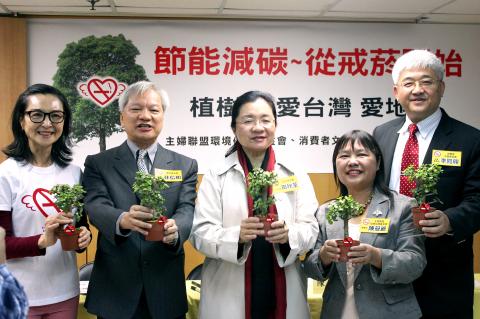Several civic organizations and a legislator yesterday said that quitting smoking was not only about improving one’s health, but could also help address the issue of carbon emissions.
At a press conference, the Homemakers United Foundation, the Consumers’ Foundation, the John Tung Foundation and Democratic Progressive Party Legislator Tien Chiu-chin (田秋堇) said that while the Fukushima Dai-ichi nuclear disaster in Japan two years ago had sparked fierce debate over nuclear energy, which the government claimed to be environmentally friendly, an easier way to reduce carbon emissions and save energy is simply to quit smoking — an alternative that they claimed has been largely overlooked.
People are now much aware of the physical damages that smoking might cause, but tobacco use may also be linked to environmental hazards such as tobacco farm-driven-deforestation, excessive use of pesticides and chemical fertilizers, pollution related to tobacco processing, cigarette packages and butts ending up as garbage, energy-consuming transportation and so on, the group said.

Photo: Chiu I-chun, Taipei Times
Tien said that the amount of carbon dioxide generated by the fabrication process alone of the cigarettes consumed by Taiwanese smokers is 36 million tonnes per year, which far exceeds the absorbable amount of the trees we have. They can in a year only consume between 11kg and 18kg of carbon dioxide each, provided that they are above the age of 20.
“[The government] should not justify the construction of the Fourth Nuclear Power Plant by saying it contributes to carbon reduction,” since carbon emissions can be reduced in many other ways that do not subject us to the risk of total destruction, and quitting smoking is one of the easiest, Tien said.
Homemakers United Foundation chairperson Chen Man-li (陳曼麗) said it takes 15 years for a cigarette butt to decompose and that Taiwanese smokers produce more than 40 billion cigarette butts a year.
“Not only are they the main cause of sewer blockages, but littered cigarettes might also cause fatal forest fires,” Chen said.
“Forty billion is actually the official number,” Consumers’ Foundation chairman Jason Lee (李鳳翱) said.
“If we include cigarettes that were smuggled into the country, the number is about 46 billion and we know that cigarettes are not a necessity of life. Consumers have a passive obligation to not to cause damages to others with their consumption,” he added.

Alain Robert, known as the "French Spider-Man," praised Alex Honnold as exceptionally well-prepared after the US climber completed a free solo ascent of Taipei 101 yesterday. Robert said Honnold's ascent of the 508m-tall skyscraper in just more than one-and-a-half hours without using safety ropes or equipment was a remarkable achievement. "This is my life," he said in an interview conducted in French, adding that he liked the feeling of being "on the edge of danger." The 63-year-old Frenchman climbed Taipei 101 using ropes in December 2004, taking about four hours to reach the top. On a one-to-10 scale of difficulty, Robert said Taipei 101

A preclearance service to facilitate entry for people traveling to select airports in Japan would be available from Thursday next week to Feb. 25 at Taiwan Taoyuan International Airport, Taoyuan International Airport Corp (TIAC) said on Tuesday. The service was first made available to Taiwanese travelers throughout the winter vacation of 2024 and during the Lunar New Year holiday. In addition to flights to the Japanese cities of Hakodate, Asahikawa, Akita, Sendai, Niigata, Okayama, Takamatsu, Kumamoto and Kagoshima, the service would be available to travelers to Kobe and Oita. The service can be accessed by passengers of 15 flight routes operated by

Taiwanese and US defense groups are collaborating to introduce deployable, semi-autonomous manufacturing systems for drones and components in a boost to the nation’s supply chain resilience. Taiwan’s G-Tech Optroelectronics Corp subsidiary GTOC and the US’ Aerkomm Inc on Friday announced an agreement with fellow US-based Firestorm Lab to adopt the latter’s xCell, a technology featuring 3D printers fitted in 6.1m container units. The systems enable aerial platforms and parts to be produced in high volumes from dispersed nodes capable of rapid redeployment, to minimize the risk of enemy strikes and to meet field requirements, they said. Firestorm chief technology officer Ian Muceus said

MORE FALL: An investigation into one of Xi’s key cronies, part of a broader ‘anti-corruption’ drive, indicates that he might have a deep distrust in the military, an expert said China’s latest military purge underscores systemic risks in its shift from collective leadership to sole rule under Chinese President Xi Jinping (習近平), and could disrupt its chain of command and military capabilities, a national security official said yesterday. If decisionmaking within the Chinese Communist Party has become “irrational” under one-man rule, the Taiwan Strait and the regional situation must be approached with extreme caution, given unforeseen risks, they added. The anonymous official made the remarks as China’s Central Military Commission Vice Chairman Zhang Youxia (張又俠) and Joint Staff Department Chief of Staff Liu Zhenli (劉振立) were reportedly being investigated for suspected “serious